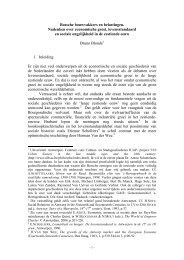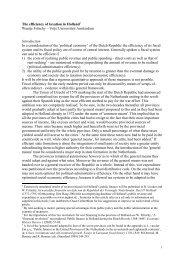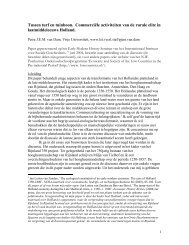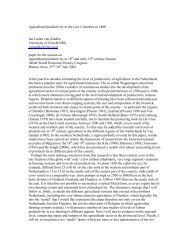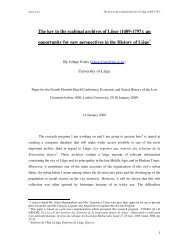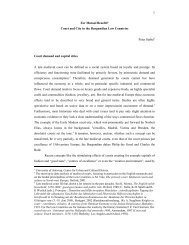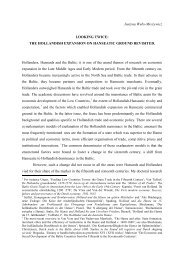Amsterdam as the cradle of modern futures and options trading ...
Amsterdam as the cradle of modern futures and options trading ...
Amsterdam as the cradle of modern futures and options trading ...
You also want an ePaper? Increase the reach of your titles
YUMPU automatically turns print PDFs into web optimized ePapers that Google loves.
in early spring, <strong>and</strong> <strong>the</strong>n sold for delivery after <strong>the</strong>y had been lifted from <strong>the</strong> soil in <strong>the</strong> early<br />
Summer. As dem<strong>and</strong> pushed up prices, <strong>futures</strong> <strong>and</strong> <strong>options</strong> began to replace forwards. By<br />
1635, trade had changed from se<strong>as</strong>onal transactions in particular bulbs, to year-round <strong>futures</strong><br />
dealings in lots <strong>as</strong>sorted by variety <strong>and</strong> by weight. To organize <strong>the</strong> market bulb growers<br />
started <strong>trading</strong> clubs run by a board <strong>and</strong> administered by a bookkeeper. 102 These inn-b<strong>as</strong>ed<br />
<strong>trading</strong> clubs are usually portrayed <strong>as</strong> <strong>the</strong> paradigm <strong>of</strong> speculative excess, dens <strong>of</strong> iniquity in<br />
which pr<strong>of</strong>essional traders luring hapless punters to speculate beyond <strong>the</strong>ir means with free<br />
wine <strong>and</strong> tall stories <strong>of</strong> gain. 103<br />
However, <strong>the</strong>re’s a sober truth behind <strong>the</strong> vivid scenes <strong>of</strong> drunken dealings in thick<br />
tobacco smoke. 104 The sessions were soundly organized to prevent any trouble arising from<br />
dodgy deals. On entering <strong>the</strong> inn, customers wishing to participate had to introduce<br />
<strong>the</strong>mselves to <strong>the</strong> bookkeeper, who <strong>the</strong>n gave <strong>the</strong>m a slate with <strong>the</strong>ir name written on it for <strong>the</strong><br />
bidding. The bookkeeper also tracked all transactions in a ledger for settlement through<br />
clearance at <strong>the</strong> end <strong>of</strong> <strong>the</strong> evening. Trade centered on what <strong>the</strong> Germans call<br />
Differenzgeschäfte, <strong>the</strong> settlement <strong>of</strong> payments by cancelling out mutual claims. A small<br />
charge w<strong>as</strong> levied on sales to cover expenses. The market for ducaton shares in <strong>the</strong> VOC<br />
which had emerged by 1650 used an identical organization, with an appointed bookkeeper<br />
tracking <strong>and</strong> clearing transactions, with <strong>the</strong> participants settling <strong>the</strong> price differences. 105<br />
The tulip <strong>trading</strong> clubs proved very effective in smoothing transactions. Nearly all<br />
notarial deeds contesting deals gone sour document transactions done outside a club, <strong>and</strong> thus<br />
not subjected to monitoring boards. 106 We may <strong>the</strong>refore conclude that <strong>the</strong> clubs acted <strong>as</strong> <strong>the</strong><br />
moderators <strong>of</strong> speculation, <strong>and</strong> not <strong>as</strong> drivers.The aftermath <strong>of</strong> <strong>the</strong> Tulipmania demonstrates<br />
just how wide <strong>the</strong> fundamentals <strong>of</strong> derivatives <strong>trading</strong> had spread. The Court <strong>of</strong> Holl<strong>and</strong><br />
refused to hear litigation c<strong>as</strong>es issuing from tulip sales, judging <strong>the</strong>m to be bets under Roman<br />
law. 107 It w<strong>as</strong> left to individual city councils to clear up <strong>the</strong> confusion surrounding deals<br />
collapsed after <strong>the</strong> bubble had burst in February 1636. The <strong>of</strong>ficial adjustments by local<br />
authorities tarred all tulip transactions still to be completed with <strong>the</strong> same brush, transforming<br />
<strong>the</strong>m into <strong>options</strong>. Buyers were no longer obliged to complete, receiving a call right in return<br />
for a premium varying from 3.5 to 10 per cent, depending on <strong>the</strong> city. 108 This transformation<br />
demonstrates first <strong>of</strong> all that by <strong>the</strong> late 1630s, city councils were sufficiently familiar with<br />
derivatives <strong>trading</strong> both to underst<strong>and</strong> <strong>the</strong> core <strong>of</strong> <strong>the</strong> problem, <strong>and</strong> to come up with an<br />
imaginative solution. Secondly, private <strong>and</strong> more or less informal arrangements sufficed to<br />
provide derivatives <strong>trading</strong> in commodities with a sound infr<strong>as</strong>tructure to reduce <strong>the</strong> risk <strong>of</strong><br />
bad deals <strong>and</strong> non-compliance. In <strong>the</strong> absence <strong>of</strong> firm documentary evidence, we can only<br />
14



